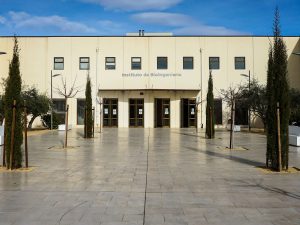
- Thursday, July 24 at 12:30 p.m.
- IB Auditorium, Vinalopó Building
- Elche Campus of Miguel Hernández University, Spain
- https://www.bioingenieria.umh.es
The seminar will consist of:
Title: “INFLUENCE OF MICROSTRUCTURAL CHARACTERISTICS ON THE FRACTURE TOUGHNESS OF REFRACTORY MATERIALS.”
Speaker: Dr. Delia Gutierrez Campos
Affiliation: Professor of Materials Science at Simón Bolívar University, Caracas, Venezuela
Date: July 24, 2025, at 12:30 p.m.
Location: Auditorium of the Institute of Bioengineering, Vinalopó Building
Organized by: Dr. Piedad De Aza
Note
On July 24, 2025, at 12:30 p.m., a research seminar entitled “Influence of microstructural characteristics on the fracture toughness of refractory materials” will take place in the auditorium of the Institute of Bioengineering (Vinalopó Building). The seminar will be given by University Professor Dr. Delia Gutierrez Campos from the Department of Materials Engineering at Simón Bolívar University, Caracas, Venezuela, and is organized by Prof. Piedad de Aza.
Dr. Delia Gutierrez Campos’ research focuses mainly on materials. She is the founder of the Refractories Chair in the Materials Engineering program and has held several academic and administrative positions, including: Head of the Ceramic Materials Laboratory, Technical Cooperation Coordinator (Industrial Internships), and Dean in charge of University Extension. She has published 26 scientific articles and supervised more than seven master’s and doctoral theses, and is a member of several scientific societies.
Brief description of the talk
Fracture toughness is a key property in refractory materials, as it determines their ability to resist crack propagation under extreme mechanical or thermal stresses. This property depends largely on the microstructural characteristics of the material, such as grain size, shape, and distribution, porosity, phases present, and the quality of intergranular bonds. For example, a microstructure with controlled pore distribution or fine, well-cohesive grains can improve the material’s ability to dissipate energy and deflect cracks, thereby increasing its fracture resistance. In addition, the incorporation of reinforcements such as ceramic fibers or secondary phases can also strengthen the structure and hinder the propagation of cracks. Microstructural control, using advanced processing and characterization techniques, allows for the design of more resistant and durable refractories, adapted to extreme conditions. Consequently, understanding the influence of microstructure not only allows for the improvement of the performance of existing refractories, but also for the development of new materials with greater efficiency, safety, and service life. Microstructural engineering is therefore essential
for the innovation and optimization of refractory materials in demanding industrial applications.

